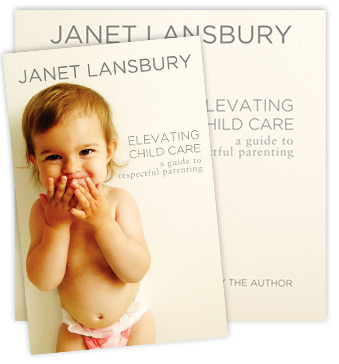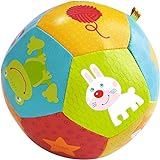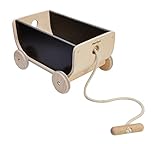My first sing-a-long (to the tune of “My Favorite Things”):
Wiping wet noses and nails that need clipping
Changing soiled diapers and medicine sipping
Sitting in car seats, injections that sting
These are a few of my favorite things…
…Said no child, ever.
And since children are inclined to resist these activities, parents tend to dread them. So, in our haste to get the job done, we rush our babies through diaper changes and lunge at their snotty noses. We distract kids in order to slip them their medicine and keep them still when they need shots. We attempt to cut their nails and hair when they aren’t looking, maybe even while they sleep.
Ironically, these tactics end up creating unpleasantness and increasing the resistance we’d hoped to avoid. Our babies learn quickly to run for the hills every time we approach them with a tissue.
But there’s a simple secret that eases the pain of these mundane duties and can even (hard as this may be to believe) transform them into enjoyable times of connection.
The secret for enlisting our children’s cooperation is the same for all aspects of successful parenting: respect. Newborns, infants, toddlers, preschoolers — people of all ages — want to be engaged with, included and invited to participate rather than have things done to them. Who can blame them?
Here are some key ways to offer respect:
1. Make the activity a familiar routine and/or give advance notice
Life can seem overwhelming to young children. The more they know going in, the more likely they’ll view an activity positively and be able to rise to the occasion.
We inform children two ways: 1) by developing predictable daily routines so they know what to expect; and 2) by talking honestly about everything that will happen (at the doctor’s office, for example) ahead of time.
“Predictability is habit forming. Developing habits makes it much easier to live with rules. Because very young children do not understand the reasons behind the rules they are expected to follow, it is better if these rules become simply a matter of course. There are some things we do not need or want to re-examine every time we do them, such as brushing our teeth.” – Magda Gerber, Dear Parent – Caring for Infants With Respect
2. Don’t interrupt
Respect your child’s play and other chosen activities. Don’t interrupt unless absolutely necessary. Oftentimes, we realize that the runny nose or wet diaper can wait until the child is finished, or at least has a bit more time. Again, prepare children: “In a few minutes it will be time to change into your PJ’s, brush teeth and chose a book.”
“If a child has ample opportunity to play independently, without interruption, he is likely to be much more willing to cooperate with the demands of his parent.” – Gerber
3. Communicate with even the youngest infants
Children are whole people from birth and we encourage their participation and partnership in tasks when we speak to them honestly and directly: “I need to wipe your nose with this tissue. Please keep your head still for a moment.”
4. Offer autonomy
Let your child do it or at least try. What’s there to lose? You might be amazed by your baby’s nose wiping talents. Children toddler age and older feel more autonomous when we offer them choices: “Would you like to take your medicine now or after lunch?” “Which fingernail shall we clip first?”
But beware of false choices. It might seem more polite and respectful to ask children, “Can I give you your medicine now?” but only if all options are acceptable to us.
5. Slow everything down
Slow down movements, words and the time in between them. The younger the child, the more time they need to process our words.
“One can further enhance the child’s sense of himself as a decision-maker by allowing enough time to elapse after requesting something, so that the child can decide on his own whether or not to cooperate.” – Gerber
6. Don’t multitask
Children need our undivided attention during these cooperative activities. Pay attention, connect and encourage children to do the same.
7. Acknowledge
If we are approaching the situation respectfully and our children still resist or object, acknowledge their feelings and point-of-view. “You are turning your head away. You don’t want me to dry your nose with the tissue. I’ll wait a little for you to be ready.”
When, despite our respectful attitude, children refuse to cooperate and we must force the (t)issue, it’s even more crucial that we acknowledge their disagreement or anger. “You didn’t like that. It upset you.”
8. Give thanks
Thank children for helping rather than offering empty “good job” praise. Acknowledge accomplishments and progress: “Now you are able to brush your own teeth!”
Chelsea shared how she ended a “spoon fight” with her 10-month-old baby by communicating with him respectfully, slowing down, and offering him autonomy:
“Every time I tried to give our baby pureed food he would reach for the spoon and hold on to it so tight that his knuckles would turn white. I would get so annoyed and would try to peel it from his hands. Feedings were getting more and more stressful. I thought the only solution would be offering more finger foods, but there were times when I needed to give him puréed food.
About a month ago I had my ‘a-ha’ moment and realized I was approaching this all wrong. I asked for the spoon. He didn’t give it to me, but he did eventually drop it. I asked if it was for me. He stared. I reached for it and explained I would put more food on the spoon and give it back.
Over the next few meals we started to master giving the spoon to each other. Now he gives the spoon — no big deal — and not only the spoon, now he likes to give me everything, rocks, toys, whatever!
Mealtime has changed 100%, and I feel like my boy actually enjoys giving to others when he wants to! Thank you for all the time you put into your Facebook page and blog. It has help me as a parent so much.
Here’s a video of our breakfast this morning…”
Thank you for allowing me to share your story, Chelsea!
For more, please check out my new book
No Bad Kids: Toddler Discipline Without Shame (now available on Audio!)
I also recommend The Secret To Turning A Toddler’s “No!” Into A “Yes!” and What To Say Instead Of “NO!” – Six Ways To Gain Your Child’s Co-operation by Lisa Sunbury, Regarding Baby
(Photo by Sara Prince)















Great article Janet, it’s all so true! We had confirmation of this yesterday with a visit to our doctor who couldn’t believe how cooperative Eiliyah was during her 18 month checkup. As you suggest, I explained to her who we were seeing, and what was likely to happen so when we arrived she was calm and prepared, happily “talking” and playing with our astounded doctor. I was so proud of her and very happy to see how all our efforts to be respectful, often in the face of discouragement, are starting to show through.
Thank you for being a guiding light in this area!
Thank you, Lish! I am so glad to hear that you are seeing the “fruits of your labor”. Keep up the wonderful work. Eiliyah is a lucky boy.
Janet, thank you so so much for this article. It could not be more timely, as nappy changes with my 8 month old, Thomas, have recently turned into a wrestling match and I’ve been a bit demoralised. Reading your article reminds me to go ‘back to basics’, slow down further, give plenty of warning, and perhaps not insist on doing things ‘my way’ – if he wants to turn over, find a way to change his nappy while he’s on his front rather than attempt to maneuver him on to his back. (Is this right?)
Hi Hilary! YES, I would definitely try to work with him, be open to trying it “his” way, be flexible. Communicate. Communicate. Communicate. Dance with him, but then also insist sometimes that he dances with you. Most importantly, let it be what it is. Here’s a thread from my community forum that might encourage you…https://www.janetlansbury.com/community/topic/diaper-change-time-is-chaos/ (Right now the forum is having some issues and my face isn’t where it’s supposed to be…)
Hi Janet
Let me start by saying I came upon your blog a few months ago when my baby was 3months and i was wondering how do i keep him engaged. What an eye opener your blog was! Thanks so much for sharing your passion which has made a huge impact on how I bring up my son. But while I try I am not always successful and do end up being nonRIE at times.
Right now my son is 6mnths and I am weaning him so chelsea’s video resonated as I am also having some challenges and was wondering what the right RIE response would be. My son loved everything I gave him for the 1st 3 weeks after which for the next 3 weeks he refuses everything! It’s not that he doesn’t like the taste I know as I have repeated a lot of what he loved in the 1st 3 weeks. He closes his mouth or turns his head every time he sees the spoon coming towards his mouth. From what I figured (I) he likes to feed himself so now I give him soft finger food alongside his main mashed meal, however obviously a lot of this lands on the floor which I think is a part of how he will learn how to feed himself (ii) he wants to play with his food and have his hands free so I will be ordering a high chair (right now he sits on my lap which is restrictive somewhat. The floor option is not ideal, he can sit unsupported but still falls ) (iii) he prefers our food… So I try to have my meals with him as far as possible and give him some of my food where feasible.
But all of this is not helping as he is still not getting much food in unless he let’s me feed him something. My husband started pretending that he is eating my son’s food and whilst this is non RIE it seems to work with my son!
I have tried to speak to my little one, be very slow and patient, let him play with food and spoons and bowls etc so that meal times can be fun and he can learn as he explores, even let him spoon feed himself however challenging but overall mealtimes are not as fun as there is less eating and more playtime followed by a big clean up time 🙂 -Any suggestions?
I’m sure Janet will have suggestions about how to interact with him…but I’m wondering about nutritional sources. When you say weaning, do you mean in the US sense (weaning off bottle or breast) or do you mean it in the UK sense (introducing other foods)?
This line concerns me: “he is still not getting much food in unless he let’s me feed him something.” At 6 months, isn’t a baby’s primary food source supposed to remain breast milk or formula? Food introduction at this age is more about allowing the baby to experience new tastes and textures… Not about replacing milk. The balance shifts gradually to more food than milk… and while some mothers need to wean from breastfeeding earlier, they replace breastmilk with formula… not strained carrots. Maybe he’s refusing food because he’s hungry and frustrated?
Thanks Meagan for your response.
To clarify, i meant introducing solids. He is a big boy and I started solids when he was 5months. I am still breastfeeding on demand and he gets as much milk as he needs / wants. However from what I understand infants also need solids from 6months and milk is not enough.
Even to introduce new tastes I need his co-operation. I am certain he is ready for solids as he loved it for first 3 weeks and still accepts anything from my plate. Challenge is I can’t yet give him same food as mine. I thought his refusal to be spoon fed may be a passing phase but it’s gone on for 3 weeks now (he is 6 1/2 months) .
At 6 months, he is learning about food but not necessarily getting many calories from it and this is NORMAL. Keep breastfeeding on demand, you might see an increase in nighttime feedings if he’s not taking enough from the breast during the day. They also go through a massive growth spurt starting around this period, so he will BF more anyways!
He won’t starve. And like any other baby period, this too shall pass. 🙂
My wife and I always said food is for fun until they’re one. Their main source of food should remain breast milk.
Based on the spoon refusal and the belief that you cannot give him the same food, I’d really urge you (and anyone getting ready to introduce solids) to read up on Baby Led Weaning. The book by Gill Rapley and Tracey Murkett is most helpful, though there are many online resources too. I find it so much more inline with my beliefs about parenting, means there’s never any of the usual struggles surrounding meals, makes kids into more adventurous eaters and means we can all eat at the same time (while food is still warm!) Between 6-12 months, it’s important for development to offer opportunities for solids, but breastmilk or formula still cover all their nutritional needs.
Hi Rashima,
Thanks for your kind, encouraging words, I’m glad we found each other!
What I’m sensing is that you are a little nervous that your baby will not eat enough, so you are trying to make it work for him… And what I (and probably RIE) would suggest is less worry, more clarity and basic trust in your son. It is not necessary for you to make mealtime fun and games to try to please your boy… I would allow a little bit of exploration, but when he has obviously stopped eating and is just playing, I would end the meal. Your boy proved himself capable of eating the solids in the beginning, so he will do it again in his time. But turning mealtime into playtime is going to confuse the issue for both of you and make matters worse.
The RIE way, as it sounds like you know, is to feed on the lap (my husband and I wore cook’s aprons for lap feedings :)) until your boy is fully capable of attain the sitting position completely on his own…and then switching to a child-sized table with him sitting on the floor (at which point he will seldom fall). Here are a couple of posts about that if you haven’t seen them (or others here are interested): https://www.janetlansbury.com/2010/01/baby-table-manners/ and https://www.janetlansbury.com/2010/08/mindful-mouthfuls-helping-our-babies-learn-healthy-eating/ (which includes a photo of my husband in his apron).
Some parents choose to use the highchair and that’s fine, too, but whatever you decide, make it a predictable routine so your little guy knows what to expect. At RIE we suggest using two spoons. You hold one and your boy holds one and gets to practice while you also help him get the food “in” if he clearly wants it. I would also offer some finger foods, since he likes them, but just one or two small pieces at a time. Keep the rest nearby, but out of his reach and it will be less overwhelming for him.
Most importantly, let go of how much he eats, how “fun” it is, etc. Make this a time to be connected with him, but with your guidance. Let it be what it is. There’s always the next meal!
Thanks a lot Janet, you hit the nail on the head! I was getting nervous and agitated that he is not eating and potentially passing this on to my son. After your response I have relaxed and so has he! He still does not eat every meal but is not repelled by the spoon. And like you said there’s always the next meal. Thanks truly for the very helpful advice.
Janet, thank you so much for this post. I have not been able to trim my 11 month old fingernails for over a week, and I am getting a bit frustrated. Your advice is very timely: I am the one who needs to calm down about this first, before even attemting to do it again! I have tried to engage him as much as I can, explaining what I am doing, I’ve tried to use a nail clipper and those little safety scissors, but he only wants to grab them to play with them and wouldn’t let me do the job. In other websites I’ve looked for suggestions, they actually encourage clipping baby’s nails while the baby is sleeping, but I’ve never felt comfortable doing this. Do you have any futher suggestions regarding this specific activity? Thanks again for this post, and your excelent blog.
Thanks, Juanita! Yes, your calmness is crucial. Then, I would let go and allow you boy to explore the clipper while you prevent him from putting it in his moth, cutting himself, etc. Acknowledge, “you are very interested in this shiny clipper aren’t you? It’s cool, isn’t it? Yes, that part moves…” Go with it. “Dance” with him and then ask him to dance with you. Tell him what you will do, stroke his finger before you clip each nail and say, “now we will clip this nail and it will feel like a little ‘snap'” You may need to insist at some point. Do so calmly and confidently and with full acknowledgement of his negative response. Remember that your boy’s objections are a positive expression of his will. It’s all good!
Janet, thank you so much for your response. I did exactly what you said, and it worked! I showed him how it was to clip my own nails first and told him we were going to do the same with his. He did cry at some point, of course, but I just acknowledged his feelings and he did not try to let go like the other times. I know he felt safer understanding what we were going through, and it was great to let him grab the nail clipper so that it wasn’t scary or mysterious to him. Thanks again for your wonderful advice!
My son (he’ll be 2 in June!!!) generally cooperates pretty well with this sort of activity. The exception is when something is wrong. Sometimes this is obvious- when he has diaper rash, he’s a lot more resistant to being cleaned up (because it hurts obviously) but other times, it’s a clue. The best example is blowing his nose. He has been fine with having his nose gently wiped for quite a while, and after a couple months in his Montessori class he even picked up on how to *blow* which was immensely helpful, but sometimes he wants nothing to do with it. He always seems a little stuffy (allergies run in the family), but when he won’t cooperate, I know his sinuses must be bothering him more than I realize… He’s not just stuffed up, he’s in some pain, and that’s something I need to know.
Other times, I’ll go to wipe his face and he’ll push away because I’m so focused on cleaning him that I’ve forgotten to be gentle with his baby skin. We’ve always expected and encouraged his cooperation, so when he doesn’t give it, it’s not misbehavior, it’s communication. Which is important from my still-not-very-verbal kid.
Sounds very healthy, Meagan. Almost 2, WOW! Thanks for sharing!
Thanks for this! We are definitely struggling with diaper changes. I’ve tried to include him in the changes by having him pick out a diaper and talk him through what is going on, but he always wants to get up half way through and get down. When I ask him to lay down, he refuses. Not sure what to do!! I hate holding him down to get the diaper on, but that is usually what I have to do.
Emily, how old is he? Is he pulling up to stand?
He’s 14 months and on the move!! He hates sitting or laying still. I cloth diaper and am just not coordinated to put the diaper on him while he is standing; although I do have him stand to put on his clothes so he can help more.
Emily,I cloth diaper too and have been having some trouble with diaper changes recently. Our son is 8 months and all he wants to do is roll onto his tummy, crawl around the changing table, sit up, pull to standing holding onto my shirt, etc. etc.
We normally use prefolds with a Snappi but this is almost impossible to put on with him moving all around. I do as much as I can with him kneeling or standing, but putting the actual diaper on is the hard part. I have a few pocket diapers, and I save these for the hardest diaper changes since I can more easily put them on him standing. I have also found that if I tri-fold the diaper in the cover it is easier to put on him while he moves around since I am not worrying about wrapping the diaper around him and getting it Snappi’d (or pinned) into place.
Sometimes I just need to give him a chance to move around diaper-free for a few minutes and then he is happy to lie back down and cooperate with putting the diaper on.
Theresa, we use fitteds with a cover, and for some reason the extra five seconds it takes to put the cover on sets him over the edge! I think he would love to run around diaper free all day, but I’m not thrilled about the idea since we have carpets in our house. :/ Maybe I’ll try letting him run a round diaper-free a few minutes to see if that helps.
Hi Janet! Your timining on this post couldn’t be better. I found your website a few months ago and have been putting a lot of your suggestions into practice with my 18-month old. I really appreciate your approach and philosophy and can see many positive changes in a short time. My question relates to bath time. My daughter will not sit. The tub is slippery and I don’t want her to fall and hit her head (which she already did once). Do you have any suggestions for how to communicate this to her? Or maybe there’s a creative way to bathe her that I haven’t thought of – a way in which she can stand and I can get her clean in a safe way. We used to love bath time and lately, it’s become a source of stress. I would so appreciate any suggestions you might have.
Hi Darrah! I would do one of two things: 1. Get a very good bathmat and stay calm when she tests so that standing becomes an uninteresting thing to do. Or, 2. I would be very clear about your expectations. Tell her before the bath that you will not allow her to stand and if she does, you will need to take her out. This may make for a couple of very quick baths, but again, when testing this limit becomes uninteresting, she will stop. What makes it interesting is a flustered, unclear or upset parent.
Love, love, love, LOVE this! Such a helpful article (as usual), but so great to also see a video of the principles in action. You can SEE the difference.
Hi Janet!
Great post! Another tip that I’d like to add is that sometimes books can help prepare a child for a big event. For example, before my toddler went to his very first dentist appointment, he was obsessed with a hand-me-down stack of Bearenstein Bear books, one of which was “Visit the Dentist”. Now, I didn’t plan it out this way; he had gone through the stack of books on his own initiative — picking out which one he wanted me to read to him. And having read through “Visit the Dentist” helped a lot for his own appointment & he was impressively cooperative for the entire time.
Love using the books, Vi! Thanks for adding your important tip.
Thanks for this post! I posted on your FB page a while back about how I could get my daughter to cooperate with teeth brushing or nose-wiping… it didn’t seem right to ask her “permission” to brush her teeth when the answer was a clear “no” and I wasn’t prepared to accept that. I’m happy to report that things are now going a lot better! I backed off from the teeth-brushing for a bit (letting my 1.5 yr old daughter kind of brush them on her own), but then one night I decided that I was just going to have to firmly, but respectfully, force the matter. Since then, I do ask her if she is ready for me to brush her teeth, and I’ll give her some time if she says do, but then I tell her, “ok, I have to brush your teeth now. I’ll do it as gently as a I can.” Then I consciously hold her face lovingly though firmly, and I tell her exactly what I’m going to brush (“ok, now I’m brushing your bottom teeth in front”). I’ve also found it helps a LOT if I am attentive to her body language. I.e., if she closes her lips and seems to want to suck on the toothbrush for a second, I pause and wait for her to finish before I continue. I think having this little bit of control really helps her, and at the same time, no longer having the control to reject teeth brushing altogether I think also has helped her a great deal. We had a few nights of struggle at first, but now most nights she opens her mouth and fully participates in the teeth brushing, even on nights when she’s tired and not too happy about the whole thing. She seems quite proud when I thank her for her cooperation afterward!
Anyway, I just wanted to share and add my vote of confidence in the methods you describe here!!
I am currently struggling with teeth brushing. My daughter is currently 15 months old. Some mornings/nights she is great and I really thank her for her cooperation and emphasize how nicer it is for both of us. I really appreciate you sharing your exact language. The fronts of her teeth are especially difficult for me to get at. Is there a particular toothbrush that you like to use? Janet, do you have any further advice to make teeth brushing a better experience?
My daughter protested at teeth brushing until we went to the dentist. Now we play dentist almost every night. “Welcome to the dentist little girl, let me see you teeth. Oh my, you mush brush them at home. Your teeth are so healthy, etc.” she sometimes even gets to lay in the recliner and wear sunglasses for the full experience!
I just love all your advice I come here everytime I’m looking for new ways to look at the way my child is acting and I always find ways to do it more like I wanted to and less like I was doing. I am new to being a mother and AP parenting is unheard of where I live I’m probably 1 of 5 or 6 in my area. I thank you so much for your advice and help.
HI janet
I came across your article when I was looking for solutions to my problem.
I’m 19 years old and during the holidays I often go babysitting. Then I have to look after three boys aged 7, 4 and 15 months. They always go to bed very late. I used to have a lot of problems with the youngest. He never wanted to go in his (sleep) romper (obviously he’s brothers can still watch Nickelodeon) and he’s very troublesome when I tell him it’s time to sleep. When I asked the parents what I could do, they told me that he’s never been easy at sleeping time. But then I read your article and the tips below. So during the summer I tried a few of your tips and it turned out well! As you suggested I gave him a little autonomy. I let him put his arms in his romper on his own and I always gave him an advanced notice (which I never did before I must say). I also let him watch TV till the end of the program. And afterwards (when he lays down in his bed and he’s been very nice) I thank him by reading a story. Since I’ve used your tips he’s a lot more easier to handle when it’s bedtime! So thank you very much!
🙂
Wow this article couldn’t have come at a better time for us, as it has really been bothering me how much I’m struggling with respectful interaction recently, specifically regarding nose wiping & nappy changes. My son has had 2 colds in the last month and absolutely HATES having his (very) snotty nose wiped and when it gets really bad I’ve been resorting to ‘surprising’ him or getting my husband to hold him while I wipe, which feels awful. Nappy changes have also got really tricky since he became mobile. I have found myself chasing him around trying to attach nappies on the move (rarely successful) but if I resort to distraction like giving him the nappy cream tube, he will often settle and let me finish. I explain what we are doing and why but he is only 9 months & it doesn’t seem to be getting us anywhere…. What am I missing?!
I was yanking things out of my 2.5 year old’s hands when he had something I didn’t want him to have. This would always upset him and then I realized I was telling him not to snatch toys from other kids. When I changed my behavior to ask for things that I wanted him to give me, he became much more cooperative. He doesn’t snatch toys as much and he’s beginning to ask for his turn. Thanks for the tips!
So great that you figured this out and made the adjustment, Becki! Kudos to you!
I rarely have trouble with diaper changes (I DO have diaper changing songs, but she LOVES singing them with me while we get her cleaned up and unless it’s a leaking situation I ask her if she’s ready for her diaper change–99% of the time she just lies right down on the floor for me to change). I DO have a lot of trouble with a very particular situation. My daughter is just under 18 months old and SLIGHTLY interested in potty training. I take her when she asks, but it’s not often and I’d say less than half the time she actually goes. My issue is when she has a poopy diaper and when I ask her if she’s ready for a change she says, “Pee pee!” (which is her asking to sit on the potty). I tell her that yes she of course can sit on the potty after I clean her poop of. However she rarely accepts that and will cry and cry “Pee pee!” while keep telling her Yes, you may sit on the potty after I clean the poop off your heiny. I hate feeling like I have to convince her or just pick her up and MAKE her get a diaper change.
I’m a big believer in RIE and have followed these sorts of things with my son all his life (3 next month). I always found him to be on the whole we’ll-behaved and tantrums were very rare. But four months ago his little brother arrived. They get on well and we seem to have avoided resentment(so Dar so good), but I just don’t seem to have time to give my eldest the choices and time I used to, because the baby is crying or calling in the background. Any suggestions or tips on balancing their competing needs so I’m not constantly nagging, yelling or enforcing?
Can you give an example? It sounds like you might be giving too many choices and being tentative. Here’s another post on this topic that might be helpful to you: https://www.janetlansbury.com/2015/10/putting-an-end-to-power-struggles-with-our-kids/
So, what do you do when holding them down is the only option? My son has an ear infection and possible strep. He has to take meds 2x/day for 10 days. I’ve tried giving him the option to help, walking him through what will happen, setting a timer and letting him know we’ll take medicine when the timer goes off, talking through his feelings and understanding them… Yesterday morning, after 45 minutes of struggle, he won and no medicine was taken. This morning, after trying all the techniques again, we had to hold him down and lay him flat so he wouldn’t spit it out. He’s more cooperative for the evening doses. I want to practice positive parenting, but it just isn’t producing any results with my 2yo son.
Do you welcome him to express his feelings about this as you are moving forward with your calm insistence? “You really don’t like this! I hear you!” I don’t recommend using the timer. I think creating those kinds of countdowns only adds fuel to a power struggle. The timer also demonstrates to your son that you are tentative around this issue.
I LOVE the song! I think singing is a wonderful opportunity to get everyone through stressful situation (including mom)!
Hi Janet. I’ve read this article and while it offers some great insight, I’m still not sure how to deal with this particular situation. My son is 3 and he has the night time routine established. So, he used to brush his teeth himself and after that I would brush them too, as he’s basically just eating the toothpaste and it’s crucial that he brushes really well cause he has a demineralization issues. Anyways, he had a cold for about a week and after that he doesn’t accept me helping him brush at all. I’m super stressed out about this and I’ve tried asking him why he won’t let me help but he just says he doesn’t want to. How should I handle this? So far, I’m just saying “you know if you don’t let me check to make sure you’ve brushed correctly, you might get cavities and we’ll have to go to the dentist to do fillings for you and you might not like that”. He just says fine and that’s that. I need help!
Hi Janet, can I check, if I’m repeatedly week after week doing ALL of the above every time in a relaxed way, and my kid wants to hold the nail clippers forever and will grab them every time I start to try cut, do I then at some point confidently continue while she cries her head off acknowledging her feelings “you really don’t like this” – or do I move to distraction (she’s completely calm if I do it while I breastfeed or she has video to watch). Ill be honest, I prefer calm compared to two minutes of floods of tears (she never really cries about anything else) because doing it the calm way feels right. But your methods would say the distracting is wrong, and undermining in the long term?